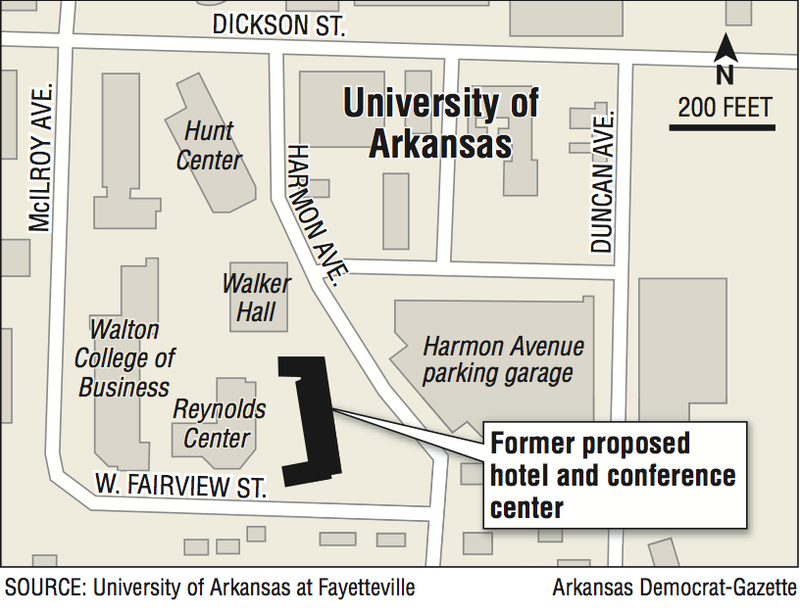FAYETTEVILLE -- The University of Arkansas at Fayetteville has dropped plans to build a hotel and conference center on campus.
"Directing resources to a hotel simply isn't a priority," UA spokesman Mark Rushing said in an email.
Chancellor Joseph Steinmetz made the decision a couple of weeks ago, Rushing wrote, adding that the university is in the middle of an academic planning process that will be used in deciding how to allocate resources.
"This is consuming our attention presently," Rushing wrote.
Arkansas Business was the first to report that plans had been halted. The proposed hotel, near buildings that are part of the Sam M. Walton College of Business, would have served the college's growing executive education program and hosted university-related events.
Estimates put the project cost in a range from $30 million to $38 million, according to Rushing.
In August -- before Steinmetz arrived Jan. 1 as UA's top leader -- a design presentation for UA System trustees outlined a hillside hotel with six levels and 120 or 128 rooms.
Questions at that time involved financing, with a projected $6 million to have come from UA fundraising and most of the cost picked up through either a commercial loan or bond issue. Earlier, UA leaders had talked about using federal tax credits to help pay for the project. But awards through the New Markets Tax Credit Program, intended to help low-income areas, are highly competitive. Tax credits for the project never materialized.
To explore the hotel's feasibility, UA had formed a partnership with FLIK International Corp. to manage the property and with Acquest Realty Advisors Inc. to serve as a developer.
Scott Davis, chief executive officer for FLIK Hospitality Group, said he could not speak for UA as to why they have decided not to move forward with the project.
"I think we'll stay in communication, and if things change at the university, we've put together a stong proposal that they could use down the road," Davis said. FLIK had been set to invest $4 million in the project.
UA has a smaller hotel on campus, the Inn at Carnall Hall, which has about 50 rooms. Other universities, including Arkansas State University in Jonesboro, have moved forward with plans to build hotels on campus.
ASU's approximately $45 million project calls for a 205-bed Embassy Suites hotel to be built with a 40,000-square-foot convention center.
Davis said he continues to see interest in universities building on-site hotels, especially when they have strong aspirations for executive education programs.
"I think that universities, as they continue to grow and expand their mission, it's a natural business component of what they do," Davis said of adding hotels.
Matt Waller, interim dean for UA's Walton College, said UA's executive education programs face competition from schools such as Michigan State University and Penn State University that have such facilities.
Waller has helped lead a push at UA to sign up more businesses in executive education, with Lowell-based J.B. Hunt Transport Services Inc. one major client.
He said UA will continue to work with smaller groups on campus.
Walton College is also developing more online executive education programs, he said, though most learners still go to the campus.
But faculty members also sometimes visit work sites to teach employees, Waller said.
"If we had the facility, we would be encouraging them to come here," Waller said. "But since we don't, we're just going to have to go to their sites more often."
When asked, Rushing said the decision to drop the hotel plan had nothing to do with an estimated $160 million proposal to renovate Donald W. Reynolds Razorback Stadium. The stadium project, which has yet to be approved by UA System trustees, would be funded with approximately $40 million in private funds and a $120 million bond issue.
Metro on 04/20/2016

